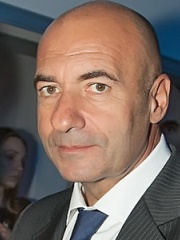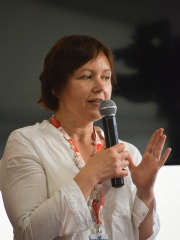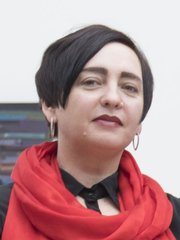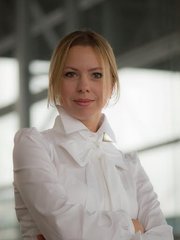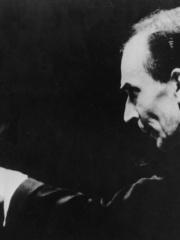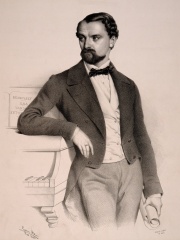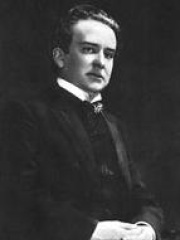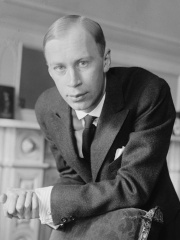
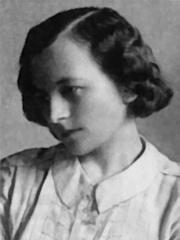
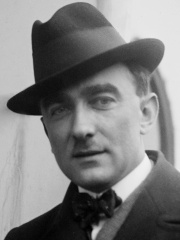
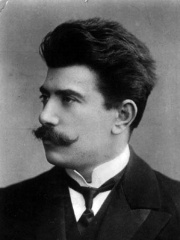
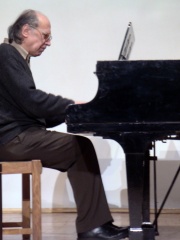
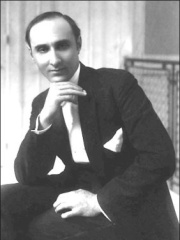
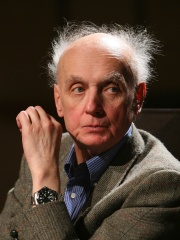
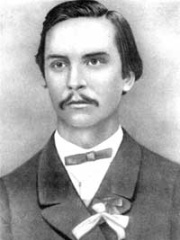
The Most Famous
COMPOSERS from Ukraine
Top 10
The following people are considered by Pantheon to be the top 10 most legendary Ukrainian Composers of all time. This list of famous Ukrainian Composers is sorted by HPI (Historical Popularity Index), a metric that aggregates information on a biography's online popularity. Visit the rankings page to view the entire list of Ukrainian Composers.

1. Sergei Prokofiev (1891 - 1953)
With an HPI of 80.86, Sergei Prokofiev is the most famous Ukrainian Composer. His biography has been translated into 78 different languages on wikipedia.
Sergei Sergeyevich Prokofiev (27 April [O.S. 15 April] 1891 – 5 March 1953) was a Russian composer, pianist, and conductor who later worked in the Soviet Union. As the creator of acknowledged masterpieces across numerous music genres, he is regarded as one of the major composers of the 20th century. His works include such widely heard pieces as the March from The Love for Three Oranges, the suite Lieutenant Kijé, the ballet Romeo and Juliet—from which "Dance of the Knights" is taken—and Peter and the Wolf. Of the established forms and genres in which he worked, he created—excluding juvenilia—seven completed operas, seven symphonies, eight ballets, five piano concertos, two violin concertos, a cello concerto, a symphony-concerto for cello and orchestra, and nine completed piano sonatas. A graduate of the Saint Petersburg Conservatory, Prokofiev initially made his name as an iconoclastic composer-pianist, achieving notoriety with a series of ferociously dissonant and virtuosic works for his instrument, including his first two piano concertos. In 1915, Prokofiev made a decisive break from the standard composer-pianist category with his orchestral Scythian Suite, compiled from music originally composed for a ballet commissioned by Sergei Diaghilev of the Ballets Russes. Diaghilev commissioned three further ballets from Prokofiev—Chout, Le pas d'acier and The Prodigal Son—which, at the time of their original production, all caused a sensation among both critics and colleagues. But Prokofiev's greatest interest was opera, and he composed several works in that genre, including The Gambler and The Fiery Angel. Prokofiev's one operatic success during his lifetime was The Love for Three Oranges, composed for the Chicago Opera and performed over the following decade in Europe and Russia. After the Revolution of 1917, Prokofiev left Russia with the approval of Soviet People's Commissar Anatoly Lunacharsky, and resided in the United States, then Germany, then Paris, making his living as a composer, pianist and conductor. In 1923 he married a Spanish singer, Carolina (Lina) Codina, with whom he had two sons; they divorced in 1947. In the early 1930s, the Great Depression diminished opportunities for Prokofiev's ballets and operas to be staged in America and Western Europe. Prokofiev, who regarded himself as a composer foremost, resented the time taken by touring as a pianist, and increasingly turned to the Soviet Union for commissions of new music; in 1936, he finally returned to his homeland with his family. His greatest Soviet successes included Lieutenant Kijé, Peter and the Wolf, Romeo and Juliet, Cinderella, Alexander Nevsky, the Fifth and Sixth Symphonies, On Guard for Peace, and the Piano Sonatas Nos. 6–8. The Nazi invasion of the USSR spurred Prokofiev to compose his most ambitious work, an operatic version of Leo Tolstoy's War and Peace; he co-wrote the libretto with Mira Mendelson, his longtime companion and later second wife. In 1948, Prokofiev was attacked for producing "anti-democratic formalism". Nevertheless, he enjoyed personal and artistic support from a new generation of Russian performers, notably Sviatoslav Richter and Mstislav Rostropovich: he wrote his Ninth Piano Sonata for the former and his Symphony-Concerto for the latter.

2. Stefania Turkewich (1898 - 1977)
With an HPI of 79.75, Stefania Turkewich is the 2nd most famous Ukrainian Composer. Her biography has been translated into 101 different languages.
Stefania Ivanivna Turkewich-Lukianovych (Ukrainian: Стефанія Іванівна Туркевич-Лукіянович; 25 April 1898 – 8 April 1977) was a Ukrainian composer, pianist, and musicologist. She is recognized as Ukraine's first woman composer. In the USSR , her works were banned by the state authorities.

3. Karol Szymanowski (1882 - 1937)
With an HPI of 71.08, Karol Szymanowski is the 3rd most famous Ukrainian Composer. His biography has been translated into 38 different languages.
Karol Maciej Szymanowski (Polish pronunciation: [ˈkarɔl ˈmat͡ɕɛj ʂɨmaˈnɔfskʲi]; 3 October 1882 – 29 March 1937) was a Polish composer, pianist and writer. He was a member of the modernist Young Poland movement that flourished in the late 19th and early 20th century. Szymanowski's early works show the influence of the late Romantic German school as well as the early works of Alexander Scriabin, as exemplified by his Étude Op. 4 No. 3 and his first two symphonies. Later, he developed an impressionistic and partially atonal style, represented by such works as the Third Symphony and his Violin Concerto No. 1. His third period was influenced by the folk music of the Polish Górale people, including the ballet Harnasie, the Fourth Symphony, and his sets of Mazurkas for piano. King Roger, composed between 1918 and 1924, remains Szymanowski's most popular opera. His other significant works include Hagith, Symphony No. 2, The Love Songs of Hafiz, and Stabat Mater. Szymanowski was awarded the highest national honors, including the Officer's Cross of the Order of Polonia Restituta, the Order of Merit of the Republic of Poland and other distinctions, both Polish and foreign.

4. Reinhold Glière (1874 - 1956)
With an HPI of 70.27, Reinhold Glière is the 4th most famous Ukrainian Composer. His biography has been translated into 37 different languages.
Reinhold Moritzevich Glière (11 January 1875 [O.S. 30 December 1874] – 23 June 1956), born Reinhold Ernest Glier, was a Russian and Soviet composer of German and Polish descent. He was awarded the title of People's Artist of RSFSR (1935) and People's Artist of USSR (1938).
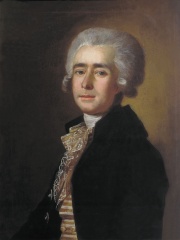
5. Dmitry Bortniansky (1751 - 1825)
With an HPI of 69.40, Dmitry Bortniansky is the 5th most famous Ukrainian Composer. His biography has been translated into 39 different languages.
Dmitry Stepanovich Bortniansky (28 October 1751 – 10 October [O.S. 28 September] 1825) was a Russian composer of Ukrainian Cossack origin. He was also a harpsichordist and conductor who served at the court of Catherine the Great. Bortniansky was critical to the musical history of both Russia and Ukraine, with both nations claiming him as their own. Bortniansky, who has been compared to Palestrina, is known today for his liturgical works and prolific contributions to the genre of choral concertos. He was one of the "Golden Three" of his era, alongside Artemy Vedel and Maxim Berezovsky. Bortniansky was so popular in the Russian Empire that his figure was represented in 1862 in the bronze monument of the Millennium of Russia in the Novgorod Kremlin. He composed in many different musical styles, including choral compositions in French, Italian, Latin, German, and Church Slavonic.

6. Valentyn Sylvestrov (b. 1937)
With an HPI of 67.71, Valentyn Sylvestrov is the 6th most famous Ukrainian Composer. His biography has been translated into 36 different languages.
Valentin Vasylyovych Silvestrov (Ukrainian: Валенти́н Васи́льович Сильве́стров, also known as Valentyn Vasilyevich Sylvestrov and Valentyn Vasil′yovych Sil'vestrov; born 30 September 1937) is a Ukrainian composer and pianist who plays and writes contemporary classical music. He is a laureate of Shevchenko National Prize.

7. Dimitri Tiomkin (1894 - 1979)
With an HPI of 67.29, Dimitri Tiomkin is the 7th most famous Ukrainian Composer. His biography has been translated into 33 different languages.
Dimitri Zinovievich Tiomkin (May 10, 1894 – November 11, 1979) was a Russian and American film composer and conductor. Classically trained in Saint Petersburg before the Bolshevik Revolution, he moved to Berlin and then New York City after the Russian Revolution. In 1929, after the stock market crash, he moved to Hollywood, where he became best known for his scores for Western films, including Duel in the Sun, Red River, High Noon, The Big Sky, 55 Days at Peking, Gunfight at the O.K. Corral, Rio Bravo, and Last Train from Gun Hill. Tiomkin received 22 Academy Award nominations and won four Oscars, three for Best Original Score for High Noon, The High and the Mighty, and The Old Man and the Sea, and one for Best Original Song for "The Ballad of High Noon" from the film High Noon.

8. Wojciech Kilar (1932 - 2013)
With an HPI of 66.04, Wojciech Kilar is the 8th most famous Ukrainian Composer. His biography has been translated into 32 different languages.
Wojciech Kilar (Polish: [ˈvɔjt͡ɕɛx ˈkʲilar]; 17 July 1932 – 29 December 2013) was a Polish classical and film music composer. One of his greatest successes came with his score to Francis Ford Coppola's Bram Stoker's Dracula in 1992, which received the ASCAP Award and the nomination for the Saturn Award for Best Music. In 2003, he won the César Award for Best Film Music written for The Pianist, for which he also received a BAFTA nomination. In 2012, he became the recipient of Poland's highest distinction, the Order of the White Eagle.

9. Mykola Lysenko (1842 - 1912)
With an HPI of 65.94, Mykola Lysenko is the 9th most famous Ukrainian Composer. His biography has been translated into 39 different languages.
Mykola Vitaliiovych Lysenko (Ukrainian: Микола Віталійович Лисенко; 22 March 1842 – 6 November 1912) was a Ukrainian composer, pianist, conductor and ethnomusicologist of the late Romantic period. In his time he was the central figure of Ukrainian music, with an oeuvre that includes operas, art songs, choral works, orchestral and chamber pieces, and a wide variety of solo piano music. He is often credited with founding a national music tradition during the Ukrainian national revival, in the vein of contemporaries such as Grieg in Norway, The Five in Russia as well as Smetana and Dvořák in what is now the Czech Republic. By studying and drawing from Ukrainian folk music, promoting the use of the Ukrainian language, and separating himself from Russian culture, his compositions form what many consider the quintessential essence of Ukrainian music. This is demonstrated best in his epic opera Taras Bulba from the novella of the same name by Nikolai Gogol, in which the grandeur, complexity and Ukrainian-language libretto prevented its staging during Lysenko's lifetime. To promote and cultivate Ukrainian culture, Lysenko set works by many Ukrainian poets to music, especially Taras Shevchenko, to whom he was particularly devoted. His musical setting of a patriotic poem by Oleksandr Konysky, known as the "Prayer for Ukraine", has become Ukraine's spiritual anthem. Lysenko had a profound influence on later Ukrainian composers, including Stanyslav Lyudkevych, Alexander Koshetz, Kyrylo Stetsenko, Yakiv Stepovy, and most importantly, Mykola Leontovych. He is the namesake of the Mykola Lysenko International Music Competition and the Lysenko music school, which is now the Kyiv National I. K. Karpenko-Kary Theatre, Cinema and Television University. Despite his immense renown in Ukraine, Lysenko remains relatively unknown outside of his home country.
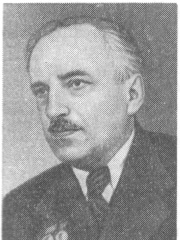
10. Boris Lyatoshinsky (1894 - 1968)
With an HPI of 65.06, Boris Lyatoshinsky is the 10th most famous Ukrainian Composer. His biography has been translated into 41 different languages.
Borys Mykolaiovych Lyatoshynsky, also known as Boris Nikolayevich Lyatoshinsky, (3 January 1895 [O.S. 22 December 1894] – 15 April 1968) was a Ukrainian composer, conductor, and teacher. A leading member of the new generation of 20th century Ukrainian composers, he was awarded a number of accolades, including the honorary title of People's Artist of the Ukrainian SSR and two Stalin Prizes. He received his primary education at home, where Polish literature and history was held in high esteem. After completing school in 1913, he entered the Faculty of Law at Kyiv University, and as a graduate was employed to teach music at the Kyiv Conservatory. During the 1910s, Lyatoshynsky wrote 31 works of various musical genres. During the 1930s he travelled to Tajikistan to study folk music and compose a ballet about the life of local people. From 1935 to 1938, and from 1941 to 1944, he taught orchestration at the Moscow Conservatory. During the war, Lyatoshynsky was evacuated and taught at the Conservatory's branch in Saratov, where he worked on arrangements of Ukrainian songs, and organised the transportation of Ukrainian musical manuscripts away to safety. Lyatoshynsky's main works are his operas The Golden Ring (1929) and Shchors (1937), the five symphonies, the Overture on Four Ukrainian Folk Themes (1926), the suites Taras Shevchenko (1952) and Romeo and Juliet (1955), the symphonic poem Grazhyna (1955), his "Slavic" piano concerto (1953), and the completion and orchestration of Reinhold Glière's violin concerto (1956). Many of his compositions were rarely or never performed during his lifetime. A 1993 recording of his symphonies first brought his music to worldwide audiences. Despite his music being criticised by the Soviet authorities, who officially banned such compositions as his Second Symphony, Lyatoshynsky never adhered to a style of socialist realism. His music was written with a modern European style, and skilfully includes Ukrainian themes. His early musical style was influenced by his family, his teachers (including Glière), and by Margarita Tsarevich. The existence of a Polish side to Lyatoshynsky's family resulted in Polish themes being central for many of his works. He also drew inspiration for his early compositions from Tchaikovsky, Glazunov, and Scriabin. His musical style later developed in a direction favoured by Shostakovich. Soviet and Ukrainian composers who studied under Lyatoshynsky, and were influenced by him, include Myroslav Skoryk and Valentyn Sylvestrov.
People
Pantheon has 35 people classified as Ukrainian composers born between 1630 and 1976. Of these 35, 7 (20.00%) of them are still alive today. The most famous living Ukrainian composers include Valentyn Sylvestrov, Igor Krutoy, and Yevhen Stankovych. The most famous deceased Ukrainian composers include Sergei Prokofiev, Stefania Turkewich, and Karol Szymanowski. As of April 2024, 2 new Ukrainian composers have been added to Pantheon including Bohdana Frolyak, and Svitlana Azarova.
Living Ukrainian Composers
Go to all RankingsValentyn Sylvestrov
1937 - Present
HPI: 67.71
Igor Krutoy
1954 - Present
HPI: 57.55
Yevhen Stankovych
1942 - Present
HPI: 56.55
Alla Zahaikevych
1966 - Present
HPI: 48.26
Edvin Marton
1974 - Present
HPI: 47.77
Bohdana Frolyak
1968 - Present
HPI: 43.40
Svitlana Azarova
1976 - Present
HPI: 42.95
Deceased Ukrainian Composers
Go to all RankingsSergei Prokofiev
1891 - 1953
HPI: 80.86
Stefania Turkewich
1898 - 1977
HPI: 79.75
Karol Szymanowski
1882 - 1937
HPI: 71.08
Reinhold Glière
1874 - 1956
HPI: 70.27
Dmitry Bortniansky
1751 - 1825
HPI: 69.40
Dimitri Tiomkin
1894 - 1979
HPI: 67.29
Wojciech Kilar
1932 - 2013
HPI: 66.04
Mykola Lysenko
1842 - 1912
HPI: 65.94
Boris Lyatoshinsky
1894 - 1968
HPI: 65.06
Igor Markevitch
1912 - 1983
HPI: 63.83
Franz Doppler
1821 - 1883
HPI: 63.20
Sergei Bortkiewicz
1877 - 1952
HPI: 62.32
Newly Added Ukrainian Composers (2025)
Go to all RankingsOverlapping Lives
Which Composers were alive at the same time? This visualization shows the lifespans of the 25 most globally memorable Composers since 1700.

